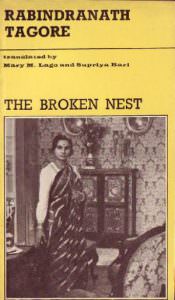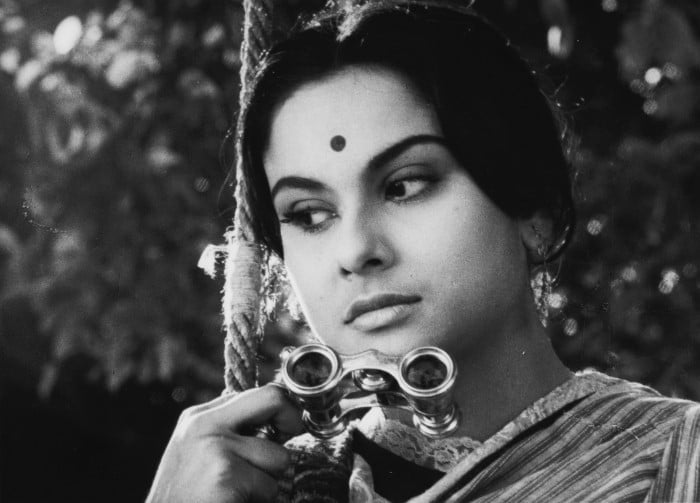The cuckoo sings in the trees and gardens
Cuckoo, cuckoo, cuckoo,
My absent heart does not know why
It was borne away completely.
These lines were Charu for me the first time I watched the film, Charulata. These sang of melancholia, of a song which was there for everyone to hear but only for one to sink in. In my re-watching of the film, they’ve come to signify more than melancholia, Charu has come to be more than her song.
Satyajit Ray’s cinema for me, like countless others who’ve had the chance to inhale and devour the aroma of his films, is beyond the shackles of time. The sensitivity and subtlety with which each frame unravels is like a melody you keep humming, the one which stays and surfaces each moment you are reminded of having heard it for the first time.
Charulata, for me, is a classic example of that melody. A visual adaptation of Rabindranath Tagore’s novella, Nastanirh (The Broken Nest), Ray’s version, true to its name, presents Charulata as the protagonist who is more human than many women characters portrayed in cinema then and, surprisingly, even now.

Image Credit: AbeBooks
The story reveals itself like Charu’s rhythmic footsteps do in the beginning, when she walks from her bookshelf to the window, to pick up her binoculars through which the world becomes next to palpable for her to experience. Charulata (Madhabi Mukherjee) is a voracious reader, a hesitant writer, and a lonely wife of Bhupati (Shailen Mukherjee), who jokingly refers to his “first love”, his newspaper, as a rival of his wife. Bhupati who does not interest himself with the ‘elusive’ world of literature which Charu holds closer, asks his cousin, Amal (Soumitra Chatterjee), an English major who has come to visit, to help Charu realize her talent of writing.
Their literary intimacy gradually shapes into their affection for each other which Charu realizes in the most famous scene of the film, when she is sitting on a swing and looks through her binoculars at the woman in distance holding a child, and then at Amal who is lying close to her writing an essay. This scene is a beautiful encapsulation of Charu’s desire: of a child, of love, of breaking away from the cage that built itself in her life.
There is longing in the way Charu looks at her husband in the beginning of the film who does not notice his wife and walks away with his newspaper which is life for him. He did not only fail to notice his wife but her desires, her wishes, her emotions that did not vent, that adjusted themselves in the grandeur of the house in which the couple lived. For Charu, her loneliness had made a room of its own, a room which was more comfortable than the one housing the world of which she could only catch glimpses of.
What caught my attention in the film was how Charu was seen feeling all that she was, unflinchingly, without restrictions of external forces.
Amal and Charu’s relationship does not last long as Bhupati’s printing press shuts because of deception received by his brother-in-law, which makes Amal feel guilty of betraying his cousin, the one who has only Amal to trust, by announcing his feelings for Charu. Bhupati, although, finds out when he sees Charu crying over Amal at the end. All these emotions are not spoken of explicitly in the film, but felt: by the characters, and through their brilliancy, by the audience.
What caught my attention in the film was how Charu was seen feeling all that she was, unflinchingly, without restrictions of external forces. This was integral for me as a woman watching the film. A woman who has been told to always share her feelings, to not keep thoughts of her own but also, to not speak too much, feel too much, or be too much. When my sense of self has been directed to derive its meaning from having thoughts for others’ well-being and rarely of my own (if I am not considered selfish), Charulata comes as a woman whose heart has space for herself, who does not need to validate her feelings from the men in her life, who isn’t a singular entity constructed to serve the interests of her husband.

Image Credit: The Dissolve
Having said that, it is also important to understand that she has the privilege to speak her mind, to be expressive of her desires and wants, for she is an upper class, upper caste educated woman from an affluent family who may not receive stigma for choosing to speak about her desires by society; who has the privilege of accepting her desires as desires in the first place.
There is an interesting scene in the film in which Bhupati is discussing the future of his newspaper with Umapada (Shyamal Ghoshal) who asks him to add more “spice” to his newspaper which only contained political affairs. Bhupati argues how only truth and concrete things like world affairs have meaning, and adding saucy and spicy material, all deviations, isn’t what he intended to do. A nice satire on today’s media which has more “spicy’ news to its aid, the spicy news which it sometimes makes for itself, in the process of which things of importance are trivialized.
Charulata comes as a woman whose heart has space for herself, who does not need to validate her feelings from the men in her life.
There is also a distinction made between traditional and new women, where the traditional woman does not know better, but the new woman with all her intellect does, but not enough. The new woman is modern but not modern enough if we compare her with men, she does want to be the traditional woman, she isn’t. Women are also seen as beings having zero knowledge and interest in politics, i.e., the reality, and as beings who rely on men for knowing things about themselves.
“A woman can’t understand a female mind. Only a man can”, says Amal.
The subtle distinction between politics and literature that plays out in Bhupati’s interactions with both Amal and Charulata can be located in the contemporary debates of science and social sciences, where the latter has to bear the brunt of not contributing enough to the economy. Yes, because that’s the only institution supporting life on this planet.
Charulata is not just any film. It speaks volumes about feelings of a woman, of the golden cage around her, and of the many cages that fluently construct themselves in the lives of women. It isn’t one narrative but many that are natural in any narrative of a human life. The cuckoo does not sing only of melancholia but also of herself. Her songs are her own, and that’s what I take away from the film. That is what remains.
Also Read: A Feminist Reading Of Mahanagar – Satyajit Ray’s Sketch Of Middle Class Morality
Featured Image Credit: Berlinale
About the author(s)
Pursuing master's in Gender, Culture and Development, she is a hoarder of stationery and stories and likes to believe she has that one story to tell that is her own. When she isn't searching for good coffee or reading about feminism and gender, she likes to binge on sleeping.




